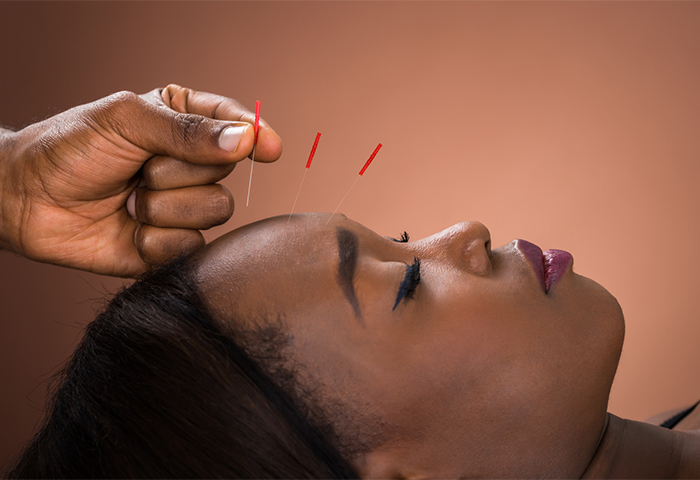
Image: istock
Hair has weight. As a woman, you may attach your power, femininity, fertility, sensuality, or even magic to it. So if your hair is thinning, your hairline receding, and a bald spot growing, you may feel like you’re losing a part of your identity. You may also feel embarrassed and ashamed; especially when you notice curious eyes wander up to that area. But there are options to help stop hair loss and regrow hair, such as acupuncture.
The Root of Hair Loss: Imbalance
According to Ann Mowat, licensed acupuncturist and founder of acupuncture and wellness clinic 512Wellness in Austin, Texas, in traditional Chinese medicine, hair loss is a sign of hormonal imbalance in the body.
Imbalance can be present in one, two, or all three of the organ systems that traditional Chinese medicine considers important to maintaining a healthy hormone system: the spleen, liver, and kidneys. Your diet and the amount of stress and strain you experience can affect these organs, which in turn can affect your “qi” or “chi”— your life force — and blood. Hair is an extension of blood. If your qi and blood are stagnant or deficient, they can affect the growth of your hair. Through acupuncture and herbal medicine, balance can be restored and your hair can be properly nourished for growth.
“Think of the balance like a river,” says Mowat. “When the current is flowing evenly, nothing’s getting stuck. The fish are moving. The plants are thriving. But if the rain pours, then the river begins to overflow and create a disturbance. By contrast, there could be no rain at all, and the river could dry up over time. The key to hair health and growth — and overall health and wellness — is to maintain the balance.”
The Organs Connected to Hair Loss and Growth
In traditional Chinese medicine, the role of each organ extends beyond the traditional Western biomedical understanding. Its approach to restoring hormonal balance is to examine how well the spleen, liver, and kidneys are functioning, and to support them accordingly.
The spleen not only aids in the smooth flow of blood, but also in the digestion of food and assimilation of nutrients. Heavy periods, which sometimes go hand in hand with hair loss, are one sign that your spleen could use a boost. Another is weak digestion, such as bloating, gas, or loose stools. Mowat says that the spleen needs to maintain “a strong digestive fire,” which she likens to a pilot light. To keep the fire burning and the light on, she recommends that her patients cut back on dairy and wheat, and to warm up the diet if it primarily consists of colder foods like salads or smoothies.
The liver is an extension of the nervous system. Mowat also calls it “the ultimate time keeper” — for example, it’s involved in regulating the length of the menstrual cycle. When the liver is overwhelmed with stress or anxiety, it can create qi or blood stagnation and disrupt the flow of blood. Symptoms can include PMS or a quick temper. When the liver is overcome, it passes the stress on to the spleen, which can lead to hair loss.
Finally, the kidneys are our “jing,” which translates to “essence.” Traditional Chinese medicine holds that when women have difficulty conceiving, they don’t have enough jing. Furthermore, as women age, their jing can decrease, leading to menopause. Key indicators in both Western and Eastern medicine are hot flashes, night sweats, and hair loss.
How Acupuncture Can Regrow Hair
Once an acupuncturist has assessed the health of these three primary organs through an in-depth health assessment form and discussion, she or he will determine which organ is most out of balance and in need of attention.
To begin to restore balance and help affect hair growth, Mowat recommends at least 10-20 acupuncture treatments, which include specific acupuncture points, particularly along the hairline to stimulate growth, and prescribed Chinese herbal medicine.
“Acupuncture is not a quick fix,” advises Mowat. “It takes time to restore balance and affect hair growth.”
In addition to traditional Chinese medicine, Mowat also encourages her clients to support body and spirit through lifestyle changes, like improving one’s diet, reducing stress through meditation, and reconnecting with oneself.
The actual experience of acupuncture — being cared for and given the space to unwind — is also restorative, adds Mowat.
The Cost of Treatment
There are two options for acupuncture treatment: private and community. For new patients in a private setting, the initial health assessment session can take 90 minutes and cost $90-$125. Follow-up sessions are 60 minutes and cost $45-$85 per session. In a community or group setting, there can be a sliding scale, ranging from $15 to $45.
Increasingly, health insurance companies recognize acupuncture as a treatment option. Mowat estimates around 40 percent of acupuncturists now accept insurance. Other clients pay out of pocket.
But Can Acupuncture Really Affect Hair Growth?
Yes, it can. But it begins with correcting the hormonal imbalance that created the hair loss in the first place, and this can take time. Hair growth results can vary, of course, but there’s no question that overall health and wellness will improve.
There’s More You Can Do
Make sure to take stock of your hair care products. It’s important to nourish the scalp and hair with nutrient-rich products, like Briogeo BE GENTLE, BE KIND Matcha + Apple Replenishing Superfood Shampoo and conditioner. Take that care to the next level with hair oils, such as Alikay Naturals Essential 17 Hair Growth Oil, SheaMoisture Jamaican Black Castor Oil Strengthen, Grow & Restore Hair Serum, and Tropic Isle Living Jamaican Black Castor Oil.
Have you ever tried acupuncture for hair loss? Tell us about your experience in the comments section below. And for more information about how diet affects hair growth, check out this article.
